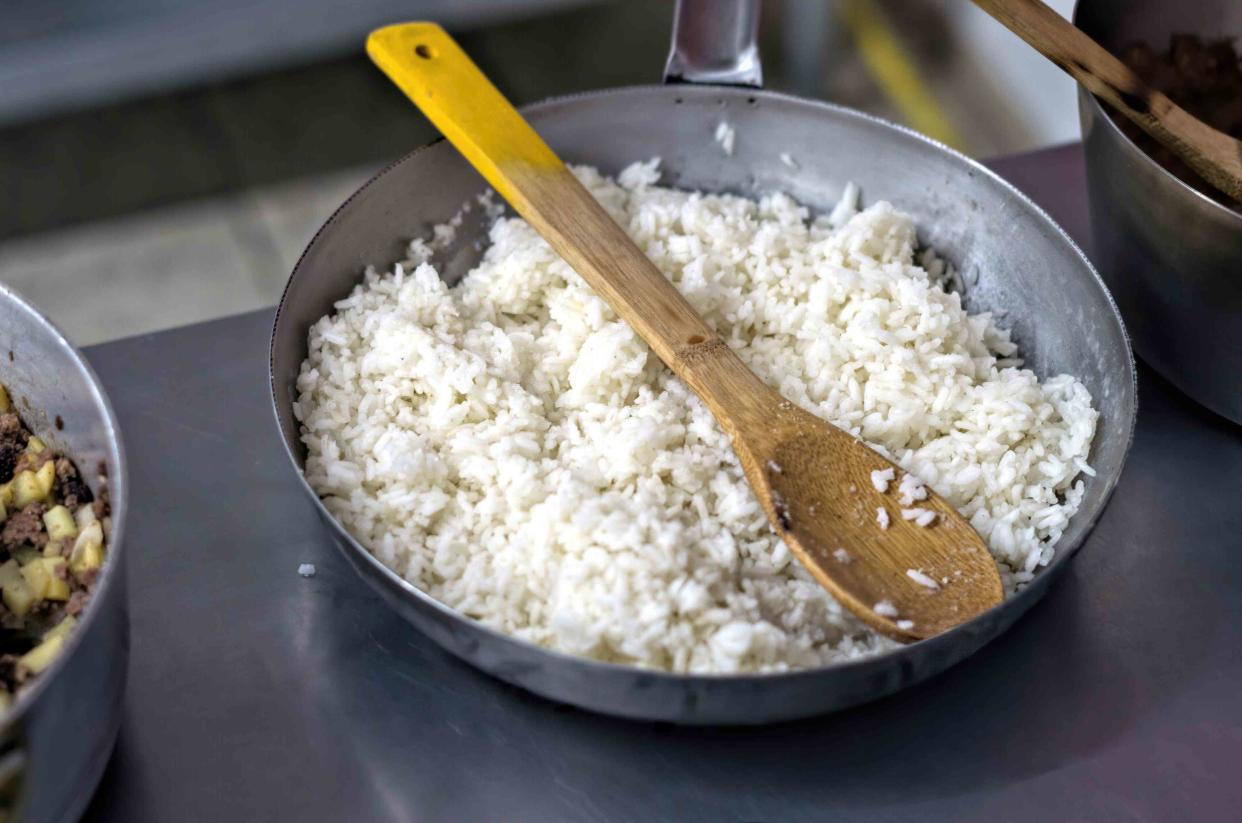You May Want to Think Twice About Reheating Leftover Rice

Simon McGill / Getty Images
Fact checked by Nick Blackmer
Key Takeaways
Bacillus cereus is a bacteria associated with food poisoning from rice, stews, and gravy.
This bacteria creates heat-resistant toxins at room temperature, so storing cooked rice in the refrigerator can reduce the risk of food poisoning.
Bacillus cereus food poisoning typically comes with 24–48 hours of nausea, vomiting, or diarrhea.
Concerns about rice food poisoning have made the rounds on TikTok. The culprit is Bacillus cereus, a common bacteria associated with rice that’s left at room temperature for too long.
Bacillus cereus food poisoning typically comes with 24 –48 hours of nausea, vomiting, or diarrhea—it’s not a life-threatening illness. But people who are immunocompromised are at greater risk of getting a serious infection.
“Most of the time, the symptoms would occur within hours and the duration of illness would probably be up to 24 hours,” Waleed Javaid, MD, an epidemiologist and Director of Infection Prevention and Control at Mount Sinai Downtown in New York City, told Verywell.
The bacteria is known to create spores, an inactive form of bacteria that are not destroyed during the cooking process. In fact, high temperatures essentially “wake up the spores,” according to Jennifer J. Quinlan, PhD, a food microbiologist and a professor in the department of nutrition sciences at Drexel University in Philadelphia, PA.
She said that when left at room temperature, these activated spores can then turn into cells that create toxins. The bad news is these toxins are also heat resistant, so reheating rice that’s been out on the counter for hours doesn’t mean that it’s safe to eat.
“That toxin is what ultimately makes people sick,” Quinlan said.
Refrigerating or reheating leftovers isn’t a guaranteed way to prevent illness from Bacillus cereus, but proper food handling strategies can help you reduce the risk of getting sick.
Related: What’s the Difference Between Norovirus (Stomach Bug) vs. Food Poisoning?
Keep Rice Refrigerated—But Not for Too Long
Bacillus cereus can also be found in soil and plants. It can contaminate a variety of foods beyond rice, including meat, stews, and gravy.
“It’s not exclusive to rice, but rice is a classic way to get it,” Quinlan said. People often make a large batch of rice, let it sit out, and then reheat it.
“There’s no need to leave it out to cool,” she said. “That’s a big myth that people have about all foods.”
Since the spores produce toxins when left at room temperature, it’s best to eat rice right away or store cooked rice in the refrigerator at 40 degrees F or below. But even if you refrigerate the rice right away, it won’t last in the fridge forever.
“My general rule is usually four days,” Isabel Maples, MEd, RDN, a registered dietitian and spokesperson for the Academy of Nutrition and Dietetics based in Washington DC, told Verywell.
According to the USDA, you should never leave food out of the refrigerator for more than two hours. And if you’re bringing cooked rice to a potluck or picking up takeout from a restaurant, Maples said it’s best to have a cooler with you, especially during the summer.
“If temperatures are 90 degrees or above then it’s only a one-hour window,” she said.
Related: Do You Really Have to Throw Out That Expired Food?
Stay Hydrated If You Suspect Rice Food Poisoning
If you do get sick after eating mishandled rice, you might experience some gastrointestinal distress for a day or two.
“It’s important to stay hydrated with sports or electrolyte drinks. Sip it slowly and start eating soft foods, like soup, once your appetite improves,” Sheila Rustgi, MD, a gastroenterologist and assistant professor of medicine with Columbia University Irving Medical Center, told Verywell in an email.
Antibiotics are not recommended for Bacillus cereus-induced food poisoning since the symptoms are caused by toxins and not the bacteria itself, Rustgi said.
Typically, symptoms will subside once the body gets rid of the toxins by vomiting or diarrhea.
“If you have any blood in your vomit or diarrhea or the symptoms persist for a few days, you should call your doctor,” Rustgi said. “You should also seek care if you are dehydrated and can’t tolerate any fluids, or if you stop making urine.”
What This Means For You
You don’t need to cut rice out of your diet to avoid Bacillus cereus food poisoning. If you plan to meal prep at home, food safety experts say you can put cooked rice in the refrigerator to cool instead of leaving it on the counter to cut down on the risk of toxins forming as the rice comes to room temperature.

